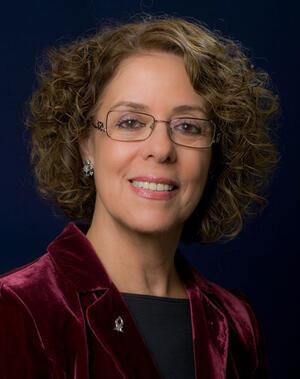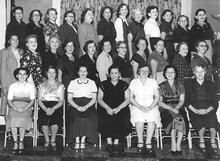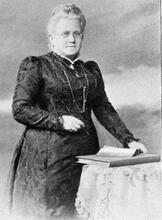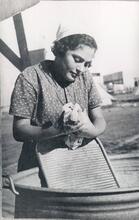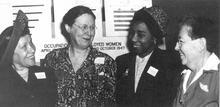Rivka Carmi
Rivka Carmi is a medical geneticist, neonatologist, pediatrician, and the first female president of an Israel university. She was Dean of the Faculty of Health Sciences, the first woman to hold this position in Israel, and late became the first woman president of an Israeli university when she was appointed president of Ben-Gurion University of the Negev. Her research focused mainly on the delineation of the clinical manifestations and molecular basis of genetic diseases in the Negev Arab-Bedouin population. She has authored over 150 publications in medical genetics, identified twelve new genes, and delineated three new syndromes, one of which is known as the Carmi Syndrome. She has played an active role in promoting women in the workplace and in academia.
Family and Education
Rivka Carmi was born in Zikhron Ya'akov, Israel, on August 11, 1948. Her mother, Zipora, was a social worker. Her father, Menachem, worked as an accountant but was also a painter, an amateur archaeologist, and knew many languages. Carmi described his death from a complication of a gastric ulcer when she was fourteen as the defining event of her life: it was then that she knew she would be a genetics researcher. “I was fascinated by the human cell,” she said (“How Fragile is the Glass Ceiling”?).
An outstanding high school student, Carmi attended classes for gifted science-loving youth at the Weizmann Institute of Science. When her high school teacher told her and her mother that she could study either sciences or humanities at university but that humanities would be much “easier,” Carmi set her heart on sciences. Recalling her high school experience, she commented, “The science class was small: about 22 students, of whom just two were girls: Margalit, whose mother was a chemistry teacher, and myself, the daughter of a social worker… but other girls didn’t have a role model-mother like Margalit’s, and they didn’t have my rebellious, ambitious genes” (“How Fragile is the Glass Ceiling?”).
Carmi served in the Israel Defense Forces, reaching the officer rank of Captain and serving as a commander of the officers' academy training school. During the Yom Kippur War, she was among the founding staff of the IDF’s special MIA unit responsible for dealing with soldiers missing in action and their families. This role created a certain bluntness in her. She noted that army “was the best school of management and leadership I ever had” (Times of Israel, January 3, 2019).
When Carmi enrolled at the Hebrew University of Jerusalem, she discovered she did not like zoology and botany studies, which were part of the requirements for a degree in biology. She consequently switched to medicine and graduated from the Hadassah Medical School at Hebrew University. She then completed a residency in pediatrics and a fellowship in neonatology at Ben-Gurion University of the Negev Soroka Medical Center, where she specialized pediatrics, and an additional fellowship in medical genetics at Boston Children’s Hospital and Harvard University Medical School. She later completed a third specialization in neonatology.
Career in Academic Medicine
Carmi began working at Ben-Gurion University of the Negev in 1976, as a lecturer in the Faculty of Health Sciences. In 1995, at the age of 45, she was promoted to full professor at the university, holding the Kreitman Foundation Chair in Pediatric Genetics. In 2000, she was elected Dean of the Faculty of Health Sciences; the first woman to hold this position in Israel, she served for five years. From 2002 to 2005, she was also the Chairperson of the Israeli Association of Medical Deans.
Carmi was deeply involved with the establishment of major biotechnology initiatives, serving as the Acting Director of the nascent National Institute for Biotechnology in the Negev. She also served as Director of the Genetics Institute at the Soroka University Medical Center and held several important academic administrative positions in the Faculty of Health Sciences at Ben-Gurion University.
Carmi has authored over 150 publications in medical genetics and has identified twelve new genes and delineated three new syndromes. One of these syndromes is known as the “Carmi Syndrome” and emerged from her first academic publication (1977), which linked sudden infant death syndrome with an accumulation of carbon dioxide in oxygen hoods, infant cribs, and incubators.
Carmi’s research has focused mainly on the delineation of the clinical manifestations and molecular basis of genetic diseases in the Negev Arab-Bedouin population. She made the strategic decision not to focus on a specific disease, but rather to start mapping the genes that cause these diseases in the Bedouin population. She also initiated community projects aimed at preventing hereditary diseases and advancing women's education in the Bedouin community.
First Woman to be Appointed President of an Israeli University
In May 2006, Carmi became the first woman to be appointed president of an Israeli university when she succeeded Avishay Braverman, who had served as president of Ben-Gurion University from 1990 to 2006. Many did not believe she would be able to fill Braverman’s shoes, but during her three tumultuous terms as president (she served until December 2018) she led the university to secure the largest financial contribution in the history of Israeli academia and continued to break glass ceilings.
Carmi brought 200 new faculty members to the University, established the National Center for Biotechnology in the Negev, and forged the Heksherim Institute, a showcase of Israel’s leading authors. She presided over a $100 million building boom, including fifteen new buildings, the Advanced Technologies Park, and the AABGU Village at Sede Boker. Her passion for game-changing alliances, including partnerships with world-class companies like Dell and IBM, put BGU on the map, not just nationally but internationally.
From 2010 to 2012, Carmi also served as the Chairwoman of the Israeli Association of University Heads. She was a founding member of the UK-Israel Science Council and served as its co-chair from 2010 to 2017. In 2013, she was appointed by Minister of Justice Tzipi Livni to be part of the Rivlin Committee, which examined the compensation agreement for workers at the nuclear research facility in Dimona who were exposed to ionizing radiation and diagnosed with cancer.
Feminism
“How Fragile is the Glass Ceiling?” TEDx talk by Rivka Carmi, former president of Ben Gurion University, 2018.
During her tenure as president of Ben-Gurion University and in her career in general, Carmi has always played an active role in promoting women in the workplace and in academia. Although she does not believe she herself has never experienced any setback because she was a woman, she “notes that she is really not an example.” She knows of “very high-quality” women who have suffered from bias, and “in a dramatic manner.” She recalled that “Someone told me, ‘There is no glass ceiling, just a thick layer of men.’… I'm not a per-se feminist. My point is how to make sure women at the university have equal opportunities. I'm talking about the gender issue in a particular context" (Haaretz, March 1, 2012). While Carmi identifies as a feminist, she is not wedded to any ideological definition of feminism.
In her 2018 TEDx talk “How Fragile is the Glass Ceiling,” Carmi recounted that she developed a feminist consciousness during her pediatrics residency. Until then, she “didn’t even know what feminism was all about.” She then realized that women were being denied promotions and other opportunities. She told the story of a woman colleague, a senior gynecologist, who expressed frustration over being passed over for associate professorship again and again, while younger, less-academically accomplished men were being granted professorships. “I was furious,” Carmi said.
So, I invited myself to a meeting with the chairman of the academic promotion committee, a distinguished professor at the medical school, and presented him with the CV. He promised to take care of it. And nothing happened…After a month I called him and told him that this was gender discrimination and that I was not going to let the issue go. He warned me: ‘You are a promising young faculty member; don’t let feminism ruin your career'…It didn’t happen to me… But I am sensitive enough to say that even if it never happened to me, it doesn’t mean anything; I am the exception to the rule.
Women have very serious obstacles everywhere, including in academia,” Carmi acknowledges, but she also believes that things are gradually improving, in part thanks to the #MeToo movement, the social media movement against sexual harassment and sexual assault, especially in the workplace.
Carmi made it her goal to increase cooperation between academia and industry, which she called “applied research,” and set out to work with government authorities to push major biotech initiatives that would potentially promote women as biotech leaders. However, she notes that, contrary to expectations, more women have yet to take on executive roles as the field has matured. She sees how difficult it is for women to get leadership roles, and thus is vocal about it; she notes that women are in the minority in terms of having their own biotech startups, find it difficult to attract investors, and struggle to balance career and family.
In 2011, Carmi was appointed chair of the Promotion and Representation of Women in Higher Education Institutions Committee (the Carmi Team). She notes that all of her committee’s recommendations have been adopted, and today all universities in Israel are rated also according to how well they integrate and promote women and how they cater to the needs of women over the course of their careers.
In May 2014, Carmi was appointed to the Locker Committee, which examined Israel's national defense budget. In 2015, she headed the Israeli Medical Association’s task force to study the status of women in medicine.
Carmi believes that her inborn assertiveness and her self-confidence have played important roles in shielding her from discrimination and sexual harassment. Only one doctor tried to harass her; it happened once, and she told him that the next time she would report him to the manager.
Post-Presidency Activities
In May 2019, Carmi received an honorary Doctor of Science degree at Brandeis University. Her citation read: “After smashing the glass ceiling twice—as the first woman to serve as dean of an Israeli medical school and the first woman to serve as president of an Israeli university—you are helping other women scale to the same heights. Throughout your career, and especially as chair of Israel’s Association of University Heads, you have promoted policies that give women an equal shot at holding leadership roles within medicine and academia… This same determination fueled your scientific pursuits from your earliest years. As a teenager, you insisted on studying the sciences. You went on to become a distinguished geneticist who, among many other accomplishments, oversaw work that sought to prevent hereditary diseases within the Bedouin community.”
Among her numerous activities, consultancies for professional and public organizations, and committee memberships, Carmi chairs a committee at the Israel Council for Higher Education (CHE) accompanying medical education as part of the international recognition process in medical schools in Israel. She heads NATAL’s Advisory Board Public Council (the Israel Trauma and Resiliency Center), which provides support to direct and indirect victims of trauma due to terror and war in Israel. She is an executive Board Member of ScienceAbroad, an Israel-based nonprofit organization that harnesses the power of senior Israeli scientists living abroad. She serves on the Board of Directors of 8400 Network, which, in association with We@Heathtech, aims to advance the healthcare and life science industry in Israel and establish an academic organization for junior women who have been recognized as having the potential to reach key managerial positions in their organizations. She is a member of the Advisory Board of the Genesis Prize Foundation, which recognizes and celebrates Jewish talent and achievement and honors individuals for their accomplishments and commitment to Jewish values. She serves on the Medination healthtech fund.
Selected Works
https://scholar.google.com/scholar?hl=en&as_sdt=0%2C5&q=carmi%2C+Rivka&…
Rena Gale, Rivka Redner-Carmi and J. Gale. “Accumulation of Carbon Dioxide in Oxygen Hoods, Infant Cots, and Incubators.” Pediatrics October 1977, 60 (4). https://pediatrics.aappublications.org/content/60/4/453
Rivka Carmi, David L. Meryash, John Wood and Park S. Gerald. “Fragile-X Syndrome Ascertained by the Presence of Macro-orchidism in a 5-Month-Old Infant.” Pediatrics November 1984, 74 (5). https://pediatrics.aappublications.org/content/74/5/883
M.D. Rivka Carmi, Joann A. Boughman. “Pentalogy of Cantrell and associated midline anomalies: A possible ventral midline developmental field.” American Journal of Medical Genetics January 1, 1992. https://doi.org/10.1002/ajmg.1320420118
Rivka Carmi, Joann A. Boughman Ph.D., Charlotte Ferencz. “Endocardial cushion defect: Further studies of “isolated” versus “syndromic” occurrence.” American Journal of Medical Genetics June 1, 1992. https://doi.org/10.1002/ajmg.1320430313
Rivka Carmi, Carol A. Magee Ph.D., Catherine A. Neill, Frederick M., Karrer. “Extrahepatic biliary atresia and associated anomalies: Etiologic heterogeneity suggested by distinctive patterns of associations.” American Journal of Medical Genetics, March 15, 1993. https://doi.org/10.1002/ajmg.1320450606
R. Carmi M.D., J. Gohar, I. Meizner, M. Katz. “Spontaneous abortion–high risk factor for neural tube defects in subsequent pregnancy.” American Journal of Medical Genetics
June 1, 1994. https://doi.org/10.1002/ajmg.1320510203
Rivka Carmi, Tatiana Rokhlina, Anne E. Kwitek-Black, Khalil Elbedour, Darryl Nishimura, Edwin M. Stone, Val C. Sheffield. “Use of a DNA pooling strategy to identify a human obesity syndrome locus on chromosome 15.” Human Molecular Genetics Volume 4, Issue 1, January 1995. https://doi.org/10.1093/hmg/4.1.9
Rivka Carmi M.D., Khalil Elbedour, Edwin M. Stone, Val C. Sheffield. “Phenotypic differences among patients with Bardet-Biedl syndrome linked to three different chromosome loci.” American Journal of Medical Genetics November 6, 1995. https://doi.org/10.1002/ajmg.1320590216
Rivka Carmi, Khalil Elbedour, Dahlia Wietzman, Val Sheffield, Ilana Shoham-Vardi. “Lowering the Burden of Hereditary Diseases in a Traditional, Inbred Community: Ethical Aspects of Genetic Research and Its Application.” Science in Context Volume 11 Issue 3-4 26 September 2008. doi:10.1017/S0269889700003094
Selected Honors and Awards
Awards
- 2001 - Lifetime Achievement Award by the Yated organization for children with Down Syndrome.
- 2002 - Award for Peace from the Canada International Scientific Exchange Program (CISEPO).
- Achievement in Medicine Award by the Municipality of Beer-Sheva.
- 2008 - Women of Distinction Award of the Hadassah Women’s Zionist Organization of America.
- 2009 - Award in excellence from the Israel Ambulatory Pediatric Association.
- 2015 - Honorary Commander of the British Empire (CBE), in the name of Queen Elizabeth II, for work to deepen scientific and academic relations between the UK and Israel.
- 2017 - Distinguished Citizen of the city of Beer Sheva.
- 2020 - Landau Prize for Life's Work Award for outstanding initiative to advance medicine and health services in the Negev.
Honorary Degrees
- 2013 - Dalhousie University, Halifax, Canada.
- 2019 - Brandeis University, Massachusetts.
Carmi, Rivka. “A Day in the Life: Prof. Rivka Carmi becomes a student for a day at BGU.” May 2017; https://www.youtube.com/watch?v=F1KdGGtJxdk
Carmi, Rivka. “How Fragile is the Glass Ceiling?” TEDx talk, March 9, 2018; https://www.youtube.com/watch?v=F1KdGGtJxdk.
Halutz, Doron. “Juggling Act.” Haaretz, March 1, 2012.
“President Prof. Rivka Carmi: Honorary Commander of the Most Excellent Order of the British Empire,” June 17, 2015; https://www.youtube.com/watch?v=5z6mvLSYT9E.
Shemer, Simona. “Israeli Women Lead the Way in Thriving Biotech Industry.” NoCamels, March 9, 2020; https://nocamels.com/2020/03/israel-women-biotech-leadership/.
Siegel-Itzkovich, Judy. “BGU first Israeli university to become member of US National Academy of Inventors.” The Jerusalem Post, September 14, 2014.
Solomon, Shoshanna. “Stepping down, first female university head speaks of tough choices, no regrets.” the Times of Israel, January 3, 2019.
“Twelve Years at the Helm: A Retrospective with BGU President Prof. Rivka Carmi,” May 28, 2018; https://www.youtube.com/watch?v=_L2oN4aV-kE.

